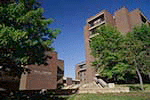SPRING 201
- Instructor: Professor E. Speer
- Hill Center 520
- 848-445-7974
- speer at math.rutgers.edu
- Office hours:
- Monday 1:40–3:00 PM, Hill Center 520
- Tuesday 10:20–11:40 PM, Hill Center 520
- Thursday 9:00–10:00 AM, Hill Center 520
- Or by appointment or chance in Hill Center 520
- Or by appointment or chance in Hill 520
- Text: Abbott, Stephen, Understanding Analysis (Second Edition). New York, Springer, 2015. We should cover the first five chapters of this text.
- General: The primary aim of this course is to teach you the rigorous foundations of calculus---foundations which were omitted in earlier calculus courses. We will give precise definitions of the concept of a limit and of such concepts as the continuity and differentiability of functions, and will prove some of the many consequences which may be deduced from these definitions. A secondary aim is to improve your skills in reading and understanding mathematics written by others and in writing precise definitions and rigorous proofs of your own.
- Workshops: Our Wednesday class is a workshop. Semeon Artamonov, the workshop instructor, will spend twenty-five minutes or so discussing homework, then ask you to form small groups to work cooperatively on problems. One workshop problem is to be written up and handed in the next week. Here is a discussion of how to write up the workshop and homework problems you hand in.
Workshops are an integral part of the course; on time attendance and participation are mandatory. More than one unexcused absence from a workshop will affect your grade; you can expect to be excused for reasons of illness or when winter weather makes travel dangerous or impossible.
- Homework: Homework problems will be assigned weekly via posting on the class web page given above. The problems are to be handed in at the beginning of the workshop.
- Academic Integrity: You will work cooperatively on workshop problems and are encouraged to discuss homework problems with me, with Semeon, and with other students. After you have finished discussing a problem (workshop or homework), however, you must write your solution independently, not in concert with others. Your ideas and approach to the problem may come from discussion, but you should express those ideas in your own words. If you consult any source, such as a web page, you must properly acknowledge this, giving a full citation, and again, your write-up must be in your own words, not copied from a source. Failure to observe these rules will be considered a violation of Rutgers' Academic Integrity policies.
- Exams: There will be two in-class exams, on Thursday, February 23, and Thursday, April 6; the final exam is on Monday, May 8, from 8:00 to 11:00 AM. Make-up exams will be given only in the case of well-documented illness or major emergency or (only with permission in advance) of a major outside commitment.
- Grading: Grading will be based on a weighted average of homework, workshops, and exams:
Homework and workshops 20% Class exams 20% each 40% Final exam 40%
Back to the class web page.



